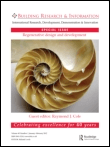
BUILDING RESEARCH AND INFORMATION
Scope & Guideline
Pioneering research for sustainable building practices.
Introduction
Aims and Scopes
- Sustainable Building Practices:
The journal promotes research that explores sustainable methods and materials in construction, including circular economy principles and energy-efficient design strategies. - Indoor Environmental Quality (IEQ):
A significant focus is placed on understanding and improving indoor environmental quality, addressing factors such as thermal comfort, air quality, and their impact on occupant health and productivity. - Digital Technologies in Construction:
The integration of digital tools such as Building Information Modeling (BIM) and smart technologies is emphasized, aiming to enhance efficiency and effectiveness in building design and management. - Social and Behavioral Aspects of Buildings:
Research often investigates the social dimensions of built environments, focusing on user experiences, behavioral responses to design, and the impact of architectural choices on community well-being. - Policy and Regulatory Frameworks:
The journal addresses the role of policies in shaping the built environment, including discussions on regulatory practices, procurement strategies, and the implications of legislation on sustainability. - Heritage and Preservation:
A unique contribution involves the study of architectural heritage, exploring methods for preservation and adaptation of historical buildings in the context of modern sustainability demands.
Trending and Emerging
- Circular Economy in Construction:
There is a growing emphasis on circular economy principles, focusing on reducing waste and promoting resource efficiency throughout the lifecycle of buildings, indicating a significant shift in industry practices. - Health and Well-being in Built Environments:
Research increasingly addresses the intersection of built environments and occupant health, exploring how design choices affect physical and mental well-being, particularly in post-pandemic contexts. - Smart and Resilient Buildings:
The integration of smart technologies and resilience strategies in building design is gaining traction, reflecting a trend towards creating adaptive environments that can respond to changing conditions and user needs. - Data-Driven Decision Making:
There is a notable rise in research utilizing big data and analytics to inform building design and management, emphasizing the role of technology in optimizing performance and sustainability. - Community Engagement in Design Processes:
Emerging themes highlight the importance of participatory approaches in the design and planning of built environments, recognizing the value of stakeholder involvement in creating spaces that meet community needs.
Declining or Waning
- Traditional Construction Methods:
Research focusing solely on conventional construction practices has decreased as the industry shifts toward more innovative and sustainable methods, such as modular and prefabricated construction. - Energy Retrofits of Existing Buildings:
While energy efficiency remains a critical topic, the specific focus on retrofitting existing buildings has waned, possibly due to a growing emphasis on new construction techniques that prioritize sustainability from the outset. - General Building Codes and Standards:
The emphasis on generic discussions about building codes has decreased in favor of more nuanced studies that explore specific policies, frameworks, and their impacts on sustainable construction. - Aesthetic Aspects of Architecture:
Research concentrating on purely aesthetic considerations without consideration of functionality or sustainability has become less prominent, reflecting a shift towards more holistic approaches in architectural design.
Similar Journals

Russian Journal of Building Construction and Architecture
Connecting Theory and Practice in Sustainable DevelopmentRussian Journal of Building Construction and Architecture (ISSN: 2542-0526; E-ISSN: 2542-0526), published by the esteemed Voronezh State Technical University, serves as a vital platform for disseminating innovative research and practical applications in the fields of building construction and architecture. This journal, situated in Voronezh, Russia, aims to explore both the theoretical and empirical aspects of contemporary architecture and construction practices, fostering a robust dialogue among researchers, professionals, and academics. With an emphasis on open access to knowledge, the journal significantly contributes to global discourse by ensuring that findings are accessible to a wide audience. Underlining the importance of sustainable development and cutting-edge technologies in construction, the journal strives to publish high-quality research that addresses the challenges faced in today’s building environment, making it an invaluable resource for those committed to advancing the industry.
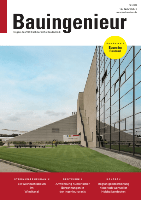
Bauingenieur
Transforming Ideas into Engineering SolutionsBauingenieur, an established journal in the field of Building and Construction and Civil and Structural Engineering, has been a significant platform for scholarly discourse since its inception in 1969. Published by VDI FACHMEDIEN GMBH & CO KG UNTERNEHMEN FACHINFORMATIONEN in Germany, this journal, available in both print (ISSN: 0005-6650) and electronic formats (E-ISSN: 1436-4867), serves as a vital resource for researchers, professionals, and students dedicated to advancing knowledge and practice in engineering. Although currently without open access options, Bauingenieur aspires to contribute to the academic community by presenting cutting-edge research, case studies, and technical reviews within the realms of construction and civil engineering. As evidenced by its categorizations in the 2023 Scopus rankings, where it has a Q4 designation in both relevant categories, it provides an essential resource for understanding current trends and challenges in the industry. The journal welcomes contributions that push the boundaries of knowledge and foster innovative solutions in the built environment.
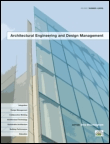
Architectural Engineering and Design Management
Connecting research and practice in architectural engineering excellence.Architectural Engineering and Design Management, published by Taylor & Francis Ltd, is a leading journal dedicated to the interdisciplinary fields of architectural engineering and design management. Since its inception in 2005, the journal has established itself as an essential resource for researchers and practitioners, showcasing the latest developments and innovative practices within the architecture and construction industries. With a commendable impact factor reflected in its Q1 ranking in Architecture and high standings across building and construction, it addresses critical themes such as sustainable design, integrated construction processes, and management strategies that drive efficiency and creativity in evolving architectural contexts. Researchers will find the journal's commitment to disseminating high-quality research—evidenced by its impressive Scopus rankings, including a #13 ranking in Architecture—particularly valuable as it fosters a deeper understanding and advancement in the profession. The journal is accessible in print and online, ensuring that academic and professional communities stay at the forefront of architectural engineering innovation.
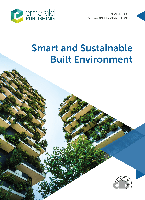
Smart and Sustainable Built Environment
Pioneering research for a sustainable built environment.Smart and Sustainable Built Environment, published by Emerald Group Publishing Ltd, is a prestigious journal dedicated to advancing the knowledge and practice of sustainable development within the landscape of modern architecture, building, and civil engineering. With an impact factor that reflects its strong influence and standing—illustrated by its consistent categorization in the Q1 tier across several relevant fields including Architecture, Building and Construction, and Urban Studies—this journal has become an essential resource for researchers, practitioners, and policymakers alike. Operating in the vibrant academic backdrop of the United Kingdom, it aims to publish cutting-edge research that addresses critical issues at the intersection of sustainability and built environments. The journal is also indexed in Scopus with impressive rankings, ensuring visibility and credibility. The scope of the journal encompasses a broad array of topics, encouraging contributions that discuss innovative practices, policies, and technologies to foster smart and sustainable development. With its dedication to publishing high-quality research from 2012 to 2024, Smart and Sustainable Built Environment is at the forefront of fostering dialogue and collaboration in the pursuit of sustainable solutions for our built environment.
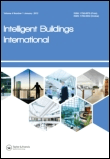
Intelligent Buildings International
Shaping Tomorrow's Buildings with Today's InnovationsIntelligent Buildings International, published by Taylor & Francis Ltd, is a premier journal dedicated to advancing knowledge in the interdisciplinary domains of building construction, civil engineering, computer science applications, and planning. Since its inception in 2009, this journal has become a vital resource for researchers, professionals, and students, offering a platform for high-quality scholarly articles that explore innovative strategies and technologies in intelligent building design and efficiencies. With its significant impact factor reflected in its Q2 and Q3 quartile rankings across various related fields, and strong Scopus rankings placing it among the top journals in Geography, Building, and Civil Engineering, Intelligent Buildings International stands out for its commitment to fostering research that enhances the sustainability and functionality of contemporary architectural practices. Readers can access a wealth of articles that illuminate the complexities of smart building technologies and their implications for future construction practices, making it an essential addition to any academic library.
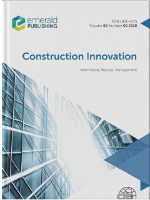
Construction Innovation-England
Transforming Ideas into Engineering ExcellenceConstruction Innovation, published by Emerald Group Publishing Ltd, is a prestigious journal dedicated to advancing knowledge in the fields of architecture, building and construction, civil and structural engineering, and computer science. With an impressive Q1 ranking across multiple categories, it holds a significant position in the academic landscape, alongside a strong Scopus ranking that further highlights its impact in engineering disciplines. The journal, bearing the ISSN 1471-4175 and E-ISSN 1477-0857, serves as a critical platform for researchers, practitioners, and students who seek to explore innovative practices and methodologies in construction. Readers can expect rigorous peer-reviewed articles that address contemporary challenges and spearhead innovations within the industry. Since its inception in 2001, Construction Innovation has established itself as a vital resource for the dissemination of knowledge, fostering collaboration and dialogue among professionals committed to shaping the future of construction and engineering practices.
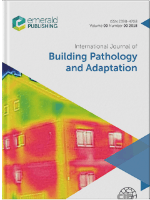
International Journal of Building Pathology and Adaptation
Pioneering research for sustainable architectural adaptation.International Journal of Building Pathology and Adaptation is a premier publication dedicated to advancing knowledge in the field of building pathology and adaptation. Established by the esteemed Emerald Group Publishing Ltd, this journal serves as a vital platform for researchers and practitioners focusing on the assessment, preservation, and innovative adaptation of built environments. With an impressive Q2 ranking in both Building and Construction and Civil and Structural Engineering, and a Scopus ranking of #62 out of 223 in the relevant engineering disciplines, the journal showcases high-quality research with significant practical implications. Although currently not featuring an open-access model, its access options cater to a wide audience aiming to explore cutting-edge studies from 2017 to 2024. The journal's commitment to bridging the gap between academic inquiry and real-world application makes it an essential resource for anyone dedicated to advancing the resilience and sustainability of the built environment.
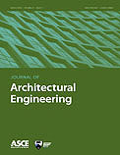
Journal of Architectural Engineering
Building Bridges Between Architecture and EngineeringThe Journal of Architectural Engineering, published by the ASCE (American Society of Civil Engineers), stands as a pivotal resource in the interdisciplinary fields of architecture and engineering. With an ISSN of 1076-0431 and E-ISSN 1943-5568, this journal has garnered a notable reputation since its inception in 1995, currently converging towards 2024. Boasting a Q1 ranking in Architecture and Visual Arts and Performing Arts, alongside respectable Q3 rankings in Building and Construction and Civil and Structural Engineering, the journal places itself in the elite class of scholarly publications, evidenced by its impressive Scopus rankings. Its commitment to providing cutting-edge research ensures comprehensive coverage across various aspects of architectural engineering, facilitating robust interdisciplinary dialogues. Although the journal operates under a traditional access model, its impact on the academic community remains profound, making it an essential platform for researchers, professionals, and students who seek to push the boundaries of knowledge in their respective fields. This journal not only aims to stimulate innovative ideas but also fosters a collaborative environment for advancing sustainable architectural practices in a rapidly evolving built environment.
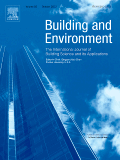
BUILDING AND ENVIRONMENT
Shaping the built environment with cutting-edge research.BUILDING AND ENVIRONMENT, published by Pergamon-Elsevier Science Ltd, stands as a premier journal in the fields of Building and Construction, Civil and Structural Engineering, Environmental Engineering, and Geography, Planning, and Development. With its ISSN 0360-1323 and E-ISSN 1873-684X, this esteemed publication has garnered significant acclaim, achieving a Q1 ranking in multiple categories for 2023, reflecting its influential role in advancing research and innovation within these domains. Spanning from 1976 to 2024, the journal invites contributions that explore the intersection of sustainable design, energy efficiency, and urban development, addressing critical issues faced in modern architecture and environmental impact. Although it does not offer open access, its comprehensive articles and reviews are pivotal for researchers, professionals, and students dedicated to creating sustainable built environments. Situated in the United Kingdom, the journal serves as a vital resource for those aiming to contribute to the knowledge base in this rapidly evolving ecologically focused field.
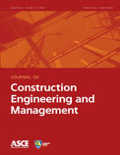
JOURNAL OF CONSTRUCTION ENGINEERING AND MANAGEMENT
Pioneering Research for a Resilient Built EnvironmentJournal of Construction Engineering and Management, published by the American Society of Civil Engineers (ASCE), is a premier scholarly journal dedicated to advancing the field of construction engineering and management. With an ISSN of 0733-9364 and an E-ISSN of 1943-7862, this respected journal boasts a noteworthy impact factor and is categorized in the Q1 quartile across significant fields such as Building and Construction, Civil and Structural Engineering, and Strategy and Management. Covering a broad spectrum of topics relevant to professionals, researchers, and students from its inception in 1982 through 2024, the journal emphasizes innovative research and practical applications that are vital to the construction industry. While it is not an open-access journal, it provides essential insights into the evolving dynamics of construction management, regulatory changes, and technological advancements, making it an indispensable resource for anyone looking to stay at the forefront of their field.